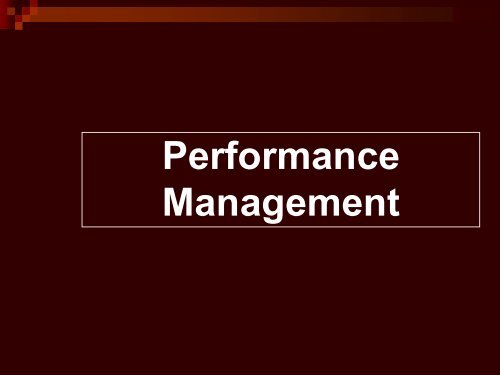Performance Management - ATI
Performance Management - ATI Performance Management - ATI
Performance Management
- Page 2 and 3: Focus of Performance Management Pro
- Page 4 and 5: MONITORING PLANNING DEVELOPING REWA
- Page 6 and 7: Performance Appraisal • A systema
- Page 8 and 9: Assessing Needs • Your (Superviso
- Page 10 and 11: Why Do Performance Management? •
- Page 12 and 13: Elements and Outcomes Elements •
- Page 14 and 15: Active Listening • Reflection •
- Page 16 and 17: Feedback • Purpose • Setting
- Page 18 and 19: Receiving Feedback • Have an open
- Page 20 and 21: Problem Solving • Define • Brai
- Page 22: Performance Appraisal Methods • R
<strong>Performance</strong><br />
<strong>Management</strong>
Focus of <strong>Performance</strong> <strong>Management</strong><br />
Progress and success<br />
toward goal achievement<br />
2
The conventional definition of<br />
management is getting work done<br />
through people, but real management<br />
is developing people through work.<br />
3
MONITORING<br />
PLANNING<br />
DEVELOPING<br />
REWARDING<br />
R<strong>ATI</strong>NG<br />
Employee performance management includes:<br />
planning work and setting expectations,<br />
continually monitoring performance,<br />
developing the capacity to perform,<br />
periodically rating performance in a summary fashion, and<br />
rewarding good performance.
Two Components<br />
•<strong>Performance</strong> Appraisal<br />
Measurement, Evaluation, Feedback,<br />
Counselling<br />
•<strong>Performance</strong> Development<br />
Training, Compensation, Reward and<br />
punishment<br />
5
<strong>Performance</strong> Appraisal<br />
• A systematic evaluation of personnel by<br />
supervisors or others familiar with their<br />
performance in order to know the<br />
employee performance<br />
• A systematic and objective way of judging<br />
the relative worth or ability of an employee<br />
in performing his task.<br />
6
<strong>Performance</strong> Measures<br />
• Quantity of work<br />
• Quality of work<br />
• Waste and breakages<br />
(accidents)<br />
• Money earned<br />
• Job knowledge<br />
• Job tenure<br />
• Attendance<br />
• Rate of advancement<br />
• Self-judgment<br />
• Judgment by peers<br />
• Judgment by<br />
supervisor<br />
7
Assessing Needs<br />
• Your (Supervisor’s) goals<br />
• The employee’s goals<br />
• The department’s goals<br />
• The organization’s goals<br />
8
Considerations<br />
• Focus on<br />
performance issues<br />
• Clear expectations<br />
• Improvement<br />
• Productivity<br />
• Objectivity<br />
• Accuracy<br />
• <strong>Performance</strong>, not<br />
person<br />
• Knowledge<br />
• Ongoing<br />
• Detailed<br />
• Monitored<br />
• Consistent<br />
• Fair<br />
• Timely<br />
• Motivational<br />
9
Why Do <strong>Performance</strong> <strong>Management</strong>?<br />
• Communicate goals, mission, values, purpose<br />
• Improve working relationships<br />
• Improve management<br />
• Identify and communicate strengths and areas<br />
for improvement<br />
• Provide feedback<br />
• Develop<br />
• Monitor<br />
• Support<br />
10
What Do Employees Want?<br />
• Clear expectations<br />
• Positive/constructive<br />
feedback on regular<br />
basis<br />
• Understand<br />
evaluation criteria<br />
• Involvement in goal<br />
setting<br />
• Accurate job<br />
descriptions<br />
• Be treated fairly and<br />
consistently<br />
• Sharing of info and<br />
resources<br />
• Job/career enrichment<br />
opportunities<br />
11
Elements and Outcomes<br />
Elements<br />
• Listening<br />
Outcomes<br />
• Better performance<br />
• Coaching<br />
• Feedback<br />
• Improved morale,<br />
trust, and loyalty<br />
• Commitment<br />
12
Listening Skills<br />
• Active listening<br />
• Expression<br />
• Verbal/non-verbal cues<br />
• Distractions<br />
• Retention<br />
13
Active Listening<br />
• Reflection<br />
• Reiteration/Paraphrase<br />
• Body Language<br />
• Elaboration<br />
• Acknowledgement<br />
14
Coaching Skills<br />
• Observation<br />
• Counsel<br />
• Condition<br />
• Criteria<br />
• Response<br />
• Solutions<br />
• Agreement<br />
• Follow through<br />
• Adjustment<br />
• Follow-up<br />
15
Feedback<br />
• Purpose<br />
• Setting<br />
• Timing<br />
• Forward focused<br />
• Two-way<br />
• Responsive<br />
• Accurate<br />
• Balanced<br />
• Relevant<br />
• Comprehension<br />
• Agreement<br />
• Follow-up<br />
16
Giving Feedback<br />
• Professional<br />
• Purpose<br />
• Listening vs. talking<br />
• <strong>Performance</strong>, not<br />
personality<br />
• Support<br />
• Privacy<br />
• Start with positive<br />
• “I” vs. “you”<br />
statements<br />
• Factual<br />
• Strategize<br />
• Goal setting focus<br />
• Resolution<br />
17
Receiving Feedback<br />
• Have an open mind<br />
• Avoid defensiveness<br />
• Listen for meaning<br />
• Seek out resolution<br />
• Give guidance<br />
• Utilize effectively<br />
18
Communicating Effectively<br />
• Preparation<br />
• Professionalism<br />
• Matching body language to message<br />
• Tone awareness<br />
• Scripting<br />
• Focusing<br />
• Responsiveness<br />
19
Problem Solving<br />
• Define<br />
• Brainstorm alternatives<br />
• Identify causes<br />
• Collect/analyze info<br />
• Consensus<br />
• Action plan<br />
20
Goal Setting<br />
SMART Goals:<br />
Specific<br />
Measurable<br />
Attainable<br />
Relevant<br />
Time sensitive<br />
21
<strong>Performance</strong> Appraisal Methods<br />
• Rating Scale<br />
• Ranking System<br />
• Paired Comparison Method<br />
• Forced Choice Method<br />
• Critical Incident Method<br />
• Forced Distribution Method<br />
• Cost Accounting Method<br />
• Confidential Report<br />
24



